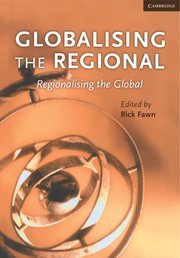Book contents
- Frontmatter
- Contents
- Preface
- Notes on contributors
- ‘Regions’ and their study: wherefrom, what for and whereto?
- Theoretical and thematic approaches
- Regional hierarchy: authority and local international order
- When security community meets balance of power: overlapping regional mechanisms of security governance
- Between the revisionist state and the frontier state regional variations in state war-propensity
- Regional cases
- Index
Between the revisionist state and the frontier state regional variations in state war-propensity
Published online by Cambridge University Press: 05 June 2012
- Frontmatter
- Contents
- Preface
- Notes on contributors
- ‘Regions’ and their study: wherefrom, what for and whereto?
- Theoretical and thematic approaches
- Regional hierarchy: authority and local international order
- When security community meets balance of power: overlapping regional mechanisms of security governance
- Between the revisionist state and the frontier state regional variations in state war-propensity
- Regional cases
- Index
Summary
Abstract. This article explains variations in state war-propensity. I introduce a new typology of state war-proneness based on four major types of states: revisionist, failed, frontier, and status quo. The major novel contribution of this essay is the argument that the combined effect of variations in the extent of success in state-building (strong or weak states) and nation-building (nationally congruent or incongruent) shapes the level and the type of state violence by producing different categories of states with regard to their war-propensity. Strong states but nationally incongruent generate revisionist states, which initiate aggressive wars. The combination of state strength and national congruence leads to a status quo state. Weakness and incongruence bring about civil wars and foreign intervention in ‘failed’ states. Weakness but congruence produce the ‘frontier state’ with boundary and territorial wars, but also with a reasonable likelihood of evolution of status quo orientation over time. I focus here on key examples of these types of states, especially from two regions: Iraq and Lebanon in a highly war-prone region – the post-World War II Middle East; and Argentina and Brazil in a more peaceful one, at least in the 20th century – South America, although these states experienced quite a number of wars in the 19th century.
Introduction
Why are some states peaceful while others experience numerous wars? In a recently major empirical study, Maoz documents the great variations in state (and also dyad) war-proneness.
- Type
- Chapter
- Information
- Globalising the Regional, Regionalising the Global , pp. 85 - 120Publisher: Cambridge University PressPrint publication year: 2009

